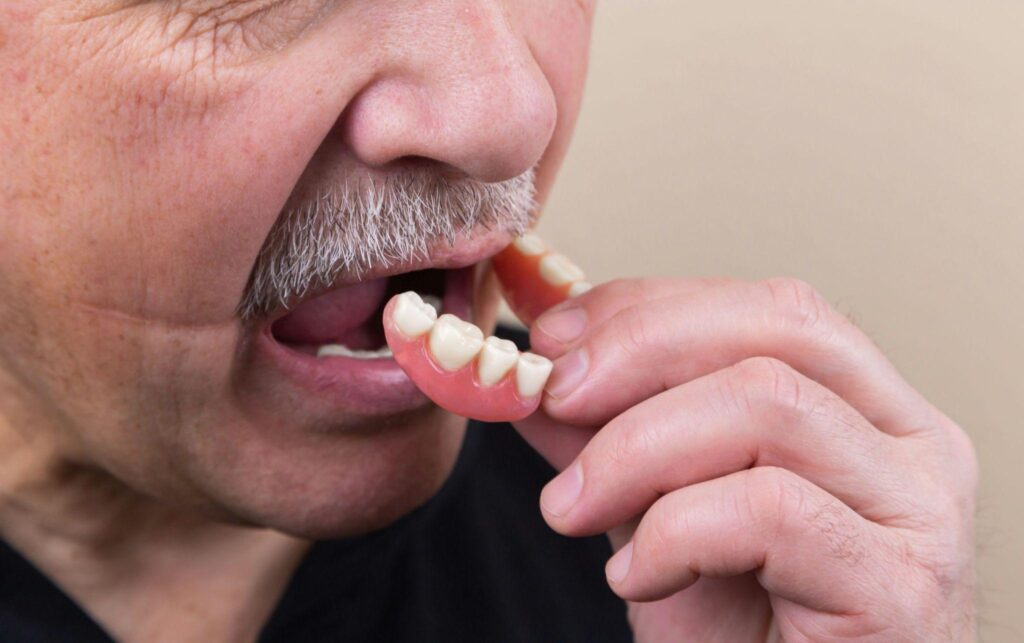Diabetes has marked repercussions on the health status of sufferers, and its proportion among the population is growing worldwide.
An association between both types of diabetes, Type 1 and 2, and periodontal (gum) disease is widely accepted and shown in many studies.1 Diabetes mellitus includes several diseases resulting from malfunctioning insulin-dependent glucose balance.
Classically, it presents as a triad of symptoms, including polydipsia (abnormally great thirst), polyuria (unusually frequent peeing), and polyphagia (excessive eating). These symptoms are the direct result of increased concentration of glucose in the blood and the resultant osmotic imbalance.
Retinopathy (involving eyes), nephropathy (involving kidneys), neuropathy (involving peripheral nerves), and coronary artery disease are the major complications of diabetes. Periodontal disease is the sixth complication of diabetes, and a skilled periodontal dentist can detect it in its early diagnosis.
Periodontal(gum) disease can also influence other complications of diabetes, namely retinopathy or coronary artery disease.
It’s important to manage typical factors that increase the risk of diabetes, such as taking care of oral health and treating periodontal disease. The beneficial effects of periodontal therapy on the metabolic control of diabetic patients exemplify the potential value of an increased understanding of the association between these diseases.2
What is periodontal disease?
Periodontal disease is normally a chronic illness caused by a lasting inflammatory process in the supporting tissues of the teeth. The supporting tissue comprises gums, socket bone, and the periodontal ligament holding the tooth in place.
The inflammatory process is the body’s response to tackle an injury or a foreign invasion, commonly caused by persisting plaque bacteria.
This chronic inflammatory process
The chronic inflammatory process induces progressive destruction of these supporting tissues, which results in the irreversible breaking of periodontal ligaments, causing the loss of teeth.
The most common factors responsible for periodontal disease are poor oral hygiene, smoking, and proneness for chronic inflammation.3
How does diabetes cause periodontal disease?
One of the preliminary sequels of diabetes in various tissues is increased inflammation. Generally, the body modulates inflammation by producing several chemical mediators to increase and decrease its propensity. Lesser release of lipid-based mediators that typically reduce inflammation may potentially contribute to severe periodontal inflammation in diabetics. Also, in periodontitis, the epithelial barrier where gums meet the teeth is affected by diabetes.
High glucose levels in the blood can lead to the crosslinking of matrix proteins and the formation of advanced glycation end-products. Bone matrix comprising abnormal crosslinking of bone matrix and natural fibers in the gum (collagen) may reduce bone and gum strength. Ultimately, this results in weak gums and an increased fracture risk with bone.
Advanced glycation end-products (AGEs) accumulate in most tissues of diabetics, including the kidney, retina, gingiva, and bone. When receptors for these AGEs are blocked, there is reduced periodontal bone loss. 4
Gum Disease Symptoms and Diabetes.
People suffering from gum disease commonly present symptoms such as tooth migration, increasing tooth mobility, bleeding gums, food impaction, and impaired chewing ability. The gums may pull away from the teeth producing a longer teeth appearance.
A few can show Classical symptoms like bleeding gums, change of gingival color to red and tender swollen gums. Also, Loose or sensitive teeth, Pain while chewing, and Persistent foul breath are a few others that indicate periodontal(gum) disease. 5
Additionally, a periodontal abscess is a frequent periodontal condition in which gum tissues may be rapidly destroyed. This ailment is one of the few clinical situations in periodontics where patients may look for prompt treatment. The single periodontal abscess is usually related to local factors like tartar and plaque that close the drainage of the periodontal pocket. Studies report the presence of multiple periodontal abscesses in uncontrolled diabetes mellitus, medically at-risk patients, and patients with untreated periodontitis after the use of systemic antibiotics. 6
Gum disease treatment and Diabetes.
Treatment of gum disease improves the overall management of periodontal infection and general health. This leads to maintaining optimum blood glucose levels in type 2 diabetes. Now emphasizing the significant impact of oral complications of gum disease on quality of life, preventing and early management of the same appears to be essential in diabetes care.3
No dental treatment is contraindicated in the well-controlled diabetic patient, although certain recommendations should be followed, such as root planning every several months.
Can you reverse periodontal disease?
Frequent reevaluation and careful monitoring allow an experienced periodontal dentist to intervene early in the diseased state to reverse or arrest the progression of periodontal disease with comprehensive non-surgical periodontal therapy.
Since gum disease is a plaque-induced infection and most patients are not skilled in proper brushing for plaque removal, Researchers suggest professional cleaning to sustain the long-term stability of the periodontium. Very few patients can maintain periodontal health over a lifetime without the benefit of regular dental care, which consists of oral hygiene instructions and deep cleaning (Scaling and Root planing).7
What is the new treatment for periodontitis?
Even though a significant effort has been put into this area, the therapy of choice for periodontitis is still the removal of supra and subgingival bacterial plaque mechanically by surface scraping with specialized instruments – Scaling and Root planing. Other Adjuvant therapies, such as antibiotics and antiseptic substances, can aid scaling. However, all these therapies can result in temporary change if the bacterial balance shifts from healthy towards a diseased oral environment again.
Hence, lifestyle modification and the discovery of therapies capable of restoring the oral microbe environment, something like the use of prebiotics and probiotics, can deliver significant results in the long-term management of both periodontitis and diabetes. 3
Strategically encouraging lifestyle modifications using communication technologies and combining them with known psychological techniques to achieve the desired behavior change are now part of personalized periodontal treatment. Much is yet unknown about the use of laser technology in periodontal treatment, and the improving understanding of the detailed mechanisms of action, along with promising treatments like antimicrobial photodynamic therapy (aPDT), will lead to the development of more effective lasers.
To select highly predictive treatments, individuals may need Artificial Intelligence. Using the more detailed and voluminous data people collect for developing AI models. AI may derive suggestions for the best treatment. It may rely not only on systematic reviews with a high level of evidence but also on a more varied database that includes individual case reports for more personalized therapy.8
Conclusion
Periodontal diseases and diabetes may have a causal link. The impact of periodontal disease on the management and progression of diabetes patients seems to be significant. Proof of association exists between periodontal inflammation, glycemic status and complications of diabetes.
Short-term evidence suggests that reduction in hemoglobin A1c levels can be due to periodontal therapy.
Although research in this area is promising, until periodontists find a more definitive treatment for these diseases, emphasis should be on oral health education and the impact that periodontitis can have on the inflammatory conditions of general health, diabetes growth and the risk of developing complications.
About the Author

Dr. Shashank Vijapure
Assistant Professor,
Periodontics & Oral Implantology,
Affiliate Associate fellow American Academy of Implant Dentistry.
Dental Content Creator
References:
- Soskolne WA, Klinger A. The relationship between periodontal diseases and diabetes: an overview. Annals of Periodontology. 2001 Dec;6(1):91-8.
- Bascones-Martinez A, Gonzalez-Febles J, Sanz-Esporrin J. Diabetes and periodontal disease. Review of the literature. Am J Dent. 2014 Apr 1;27(2):63-7.
- Păunică I, Giurgiu M, Dumitriu AS, Păunică S, Pantea Stoian AM, Martu MA, Serafinceanu C. The Bidirectional Relationship between Periodontal Disease and Diabetes Mellitus-A Review. Diagnostics (Basel). 2023 Feb 11;13(4):681. doi: 10.3390/diagnostics13040681. PMID: 36832168; PMCID: PMC9954907.
- Graves DT, Ding Z, Yang Y. The impact of diabetes on periodontal diseases. Periodontol 2000. 2020 Feb;82(1):214-224. doi: 10.1111/prd.12318. PMID: 31850631.
- Salvi GE, Roccuzzo A, Imber J-C, Stähli A, Klinge B, Lang NP. Clinical periodontal diagnosis. Periodontol 2000. 2023;00:1-19. doi:10.1111/prd.12487
- Herrera D, Roldán S, Sanz M. The periodontal abscess: a review. Journal of Clinical Periodontology: Review article. 2000 Jun;27(6):377-86.
- Drisko CH. Nonsurgical periodontal therapy. Periodontology 2000. 2001 Jan 1;25:77-88.
- Kikuchi T, Hayashi JI, Mitani A. Next-Generation Examination, Diagnosis, and Personalized Medicine in Periodontal Disease. J Pers Med. 2022 Oct 20;12(10):1743. doi: 10.3390/jpm12101743. PMID: 36294882; PMCID: PMC9605396.





